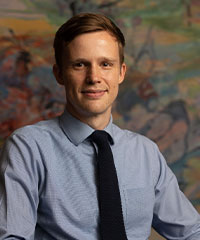Grant Recipient Contributes to Development of Novel Antibody-Toxin Conjugate

In 2023, Benjamin R. Schrank, MD, PhD, received a Research Resident Grant from the R&E Foundation. Today, he is proud of his contribution to groundbreaking research that is shaping the future of cancer care—made possible in part by the grant he received.
Immunotherapies represent a new wave in cancer care. Through his research, Dr. Schrank has contributed to the development of a cancer treatment that combines a tumor targeting antibody with a new drug, forming an antibody-drug conjugate (ADC).
What makes this approach a bit different, however, is that instead of delivering a chemotherapy agent, it introduces a bacterial toxin— listeriolysin O—into the tumor.
“Our research aimed to overcome key bottlenecks in the immune system’s ability to recognize and eliminate tumors,” Dr. Schrank said. “We engineered an antibody-toxin conjugate (ATC) called CD47-LLO that simultaneously enhances tumor cell phagocytosis and promotes cytosolic delivery of tumor antigens and DNA within antigen-presenting cells.”
Dr. Schrank collaborated on this research with his mentors Wen Jiang, MD, PhD, and Betty Kim, MD, PhD, at MD Anderson. Dr. Jiang is a 2016 RSNA Research Resident Grant recipient and a 2017 Roentgen Resident/Fellow Research award winner.
“This strategy marks a conceptual shift in the design of ATCs: We're moving beyond simply delivering toxic compounds to tumor cells and are now leveraging immune-stimulating payloads to reprogram the tumor microenvironment,” Dr. Schrank explained.
When asked how this approach might impact patient care if successfully translated to the clinic, Dr. Schrank said: “Our data shows that CD47-LLO not only controls local tumors but also generates systemic antitumor responses and immune memory, suggesting its utility in both localized and metastatic settings. If successfully translated to the clinic, CD47-LLO or similar ATCs could provide a novel treatment option, especially in combination with existing immunotherapies, for patients with difficult-to-treat solid tumors.”
Dr. Schrank acknowledged that the funding from the Foundation enabled his team to perform critical early experiments validating their concept and establishing the biochemical and immunologic properties of CD47-LLO. “As a resident physician, this work has shaped my research identity and expanded my vision for how bioengineering and immunotherapy can converge to improve cancer care,” he said.
Join us today in supporting this important work! Learn more about the R&E Foundation and make a donation.
